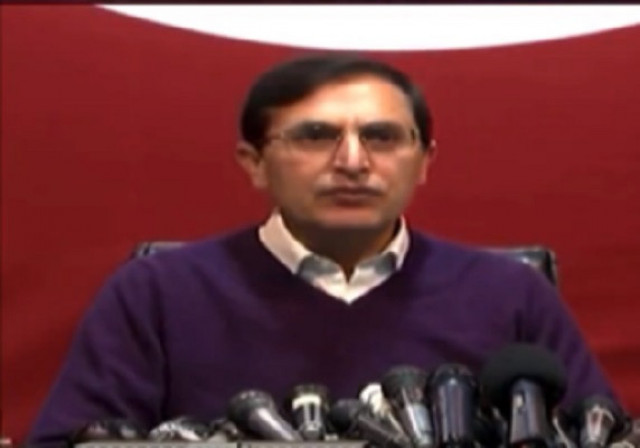PTI gambit ahead of reserved allotment
PML-N to bag 19 seats in NA followed by PPP with 11

The process of allotment of reserved seats for women and minorities to the political parties in the National Assembly and the provincial legislatures has entered its final stage, following the compiling of the results of the recent general polls by the Election Commission of Pakistan (ECP) but the situation has become intriguing after the PTI-backed independent lawmakers, who has just joined the Sunni Ittehad Council (SIC), has 93 members in the lower house of parliament as well 84 and 116 in Khyber-Pakhtunkhwa and Punjab assemblies, respectively.
As per the Constitution, the reserved seats are allocated to the political parties on the basis of the number of their lawmakers elected on the general seats. For their allocation, the ECP had already received the priority list of candidates from the parties before the February 8 general elections.
The situation this year is different from the previous elections as the largest group of lawmakers are independents, who cannot have the reserved seats.
Barring a few, these independents are backed by the PTI, which was unable contest on its popular electoral symbol of the ‘cricket bat’.
There are a total of 346 reserved seats for women -- 60 in the NA and 66, 29, 26, and 11 in the provincial legislatures of Punjab, Sindh, K-P, and Balochistan.
Similarly, there are 10 reserved seats for minorities in the lower house. Besides, there are eight, nine and three reserved seats for minorities in the Punjab Sindh, and Balochistan assemblies.
Based on the current election results, the PML-N is likely to bag 17 reserved seats for women in the NA, 33 in Punjab and one in Balochistan.
Besides, it will also be allocated two reserved seats for minorities in the lower house and four in Punjab.
The PPP will fetch 10 reserved seats in the NA from Sindh as well as a reserved seat each for women and minorities from Punjab in the lower house.
The party will receive 19 reserved seats for women and six for minorities in the Sindh Assembly. In addition, it will bag two reserved seats for minorities in the Punjab Assembly as well.
The MQM-P will bag four women's seats in the NA. It will also fetch six seats for women and two for minorities in the Sindh Assembly.
Based on these figures, if the PTI-backed members after their inclusion in the SIC, the party will be allocated 22 reserved seats for women in the NA, 20 in K-P, and 27 in Punjab, beside three seats for minorities.
However, the SIC had neither applied for any reserved seat to the ECP -- a requirement under the law -- nor had it filed a priority list of candidates before the elections.
Also, the ECP has already rejected the Form 33 nominations filed by the PTI candidates for the reserved seats.
Sources said the SIC would apply for the allocation of the reserved seats to the ECP.
In case, the ECP decides against the SIC, those 22 NA and 20 provincial assembly seats might be allocated to the other parties.
According to the lists submitted to the ECP, the PML-N women lawmakers who will take the NA seats include Tahira Aurangzeb, Shaista Pervaiz Malik, Marriyum Aurangzeb, Nuzhat Sadiq, Musarrat Asif, Seema Mohiuddin, Shaza Fatima, Romina Khurshid Alam, Wajiha Qamar, Zaib Jaffar, Kiran Imran, Anusha Rahman, Zahra Wadood Fatemi, Asyia Naz Tanoli, Saba Sadiq, and Farah Naz Akbar.
The party’s nominees to take seats in the Punjab Assembly include Zakia Khan, Ishrat Ashraf, Azma Bokhari, Hina Pervaiz Butt, Salma Saadia, Rahila Naeem, Bushra Anjum, Sania Ashiq, Salma Butt, Kanwal Pervaiz Chaudhry, Mehwish Sultana, Nosheen Adnan, Asma Ehtishamul Haq, Kausar Javed, Uzma Jabeen, Ambreen Ismail, Mumtaz Begum, Sandal Malik Hussain, Rukhsana Kausar, Shazia Rizwan, Motiya Begum, Rabia Naseem Farooqui, Sonia Ashir and Uzma Kardar.
For the PPP, those taking the reserved seats in the NA include Hina Rabbani Khar, Shehla Raza, Shagufta Jumani, Mehreen Razak Bhutto, Naz Baloch, Sharmila Farooqi, Mehtab Akbar Rashdi, Shazia Sobia and Mudassar Sahar Kamran.
Those to take seats in the Sindh Assembly include Seema Khurram, Tanzeela Umm Habiba, Rehana Leghari, Yasmin Shah, Nuzhat Pathan, Syeda Marvi Faseeh, Sadia Javed, Farzana Hanif, Sajila, Hina Dastgir, Rukhsana Parvez, Nida Khoro, Saima Agha, Ruma Sabat, Arooba Rabbani, Khairun Nisa and Maleeha Manzoor.
The MQM-P's top list for the NA includes Asia Ishaq Siddiqui, Nighat Shakeel Khan, and Sabeen Ghori.
Sofia Saeed Shah, Sikandar Khatoon, Kiran Masood, Farah Sohail, Bilqis Mukhtar, and Qaratul Ain are the MQM-P’s picks for the seats in the Sindh Assembly.
In the current National Assembly at least 10 political parties are out of the race for receiving the reserved seats.
These parties include the Tehreek-e-Labbaik Pakistan (TLP), Istehkam-e-Pakistan Party (IPP), Markazi Muslim League (MML), PML-Q, PML-Zia, BNP-M, BNP-Awami, BAP, PkMAP, ANP and Jamaat-e-Islami (JI).
Previously, the PTI started negotiations with the JI to use its platform for bagging the reserved seats. However the talks, according to sources, broke down because the JI had already submitted its list of candidates for the reserved seats that could not be altered.
According to the sources, if the PTI used the JI platform, it would put 22 JI lawmakers in the NA, besides 30 in the Punjab Assembly and a large group in the K-P Assembly.
The PTI independent members were of the opinion that the move would directly benefit the JI. Therefore, they refrained from forming an alliance with the party.
An ECP spokesperson drew attention of the politicians for the reserved seats to file the returns of their election expenses (Form C) by Wednesday (today).
The spokesperson added that if they did not file the returns, the notification of their success would not be issued.



















COMMENTS
Comments are moderated and generally will be posted if they are on-topic and not abusive.
For more information, please see our Comments FAQ